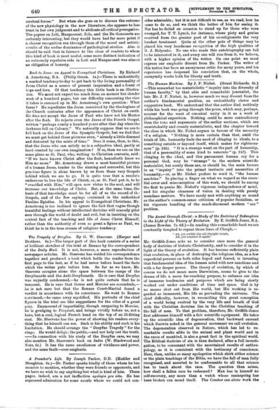The Human Machine. By J. F. Nisbet. (Grant Richards. 6s.)
—This somewhat too materialistic " inquiry into the diversity of human faculty," by that able and remarkable journalist, the late Mr. J. F. Nisbet, is, however much we may dissent from the author's fundamental position, an undoubtedly clever and suggestive book. We understand that the author died suddenly while his book was going through the press, which may, perhaps, account for the want of essential unity in it as a work of philosophical exposition. Nothing could be more contradictory than the tone and arguments of the earlier sections, which are unmistakably and crassly materialistic, and the chapter toward the close in which Mr. Nisbet argues in favour of the necessity of a religion. " Nothing is more certain than that, amid the trials of life, humanity feels the need of clinging to ideals, to a something outside or beyond itself, which makes for righteous- ness " (p. 245). " It is a strange want on the part of humanity, that of a personality of some kind to venerate" (p. 247). This clinging to the ideal, and this paramount human cry for a personal God, may be "strange" to the modern scientific materialist, but surely these are, or should be, the main factors in an "inquiry" into the primal instincts and necessities of humanity,—or, as Mr. Nisbet prefers to word it, "the human machine." In placing a finger on what we regard as the essen- tial error and misconception of this work, we should be among the first to praise Mr. Nisbet's vigorous independence of mind, and his singular clearness of vision in dealing with purely mundane matters. We have rarely met with anything so sound as the author's common-sense criticism of popular Socialism, or his vigorous handling of the much-discussed modern " sex" problem.






















































 Previous page
Previous page